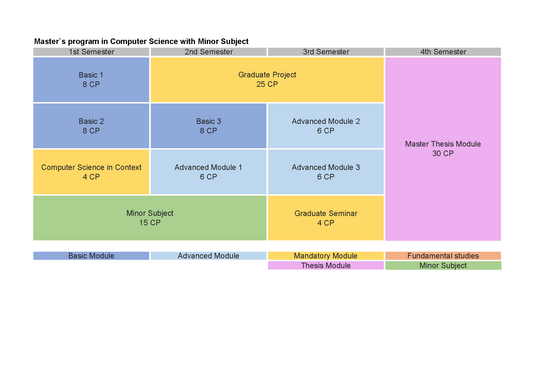Master's program in Computer Science
The Master's degree course in Computer Science is characterized by elective options that allow you to set your study focus. The structure of the basic and specialization modules in the research areas makes it easier for you to find your way around:
- Software, security and verification
- Embedded and distributed systems
- Intelligent systems
- Algorithms and Complexity
The Master's degree course in Computer Science is a full-time, on-campus course with a standard period of study of four semesters (two years) and leads to the degree of Master of Science (M.Sc.). It starts in the winter and summer semesters. To enrol on the Master's degree program in Computer Science, you must generally have a very good or good (grade 2.9 or better) relevant (Computer Science) Bachelor's degree.
The course language is usually German. Here you will find courses that are (also) offered in English.
Directly to the application in the TU Dortmund University campus portal
In the Master's program, you take part in courses (e.g. in a project group) that correspond exclusively to your interests. This specialization opens up further career prospects for you. The Master of Science is equivalent to the Diplom.
The Master's examination regulations for Computer Science allow you to apply for a specialization if the supervisor of your Master's thesis supports this. If you have passed modules (apart from the project group) worth at least 30 credit points relating to this specialization, the specialization can be shown on your Master's certificate.
The Examination Board will make it easier for you to apply for some predefined specializations:
- specialization "Algorithmics"
- specialization in "Cyber-Physical Systems"
- specialization in "Data Science"
- Specialist focus area "Logics, Information, and Knowledge"
- Specialist focus on "Optimization"
- Specialist focus on "Software and Service Engineering"
Below is a sample study plan with its various modules. You can find more curricula here.

The basic modules introduce you to a research area. You must complete three basic modules from at least two of the research areas. Specialization modules introduce you to current research topics.
In the seminar , you will familiarize yourself with current literature in a specific field. Computer Science in Context prepares you for management tasks through legal, organizational psychology or business management topics.
As a computer scientist, you will work in an interdisciplinary way. You can continue a minor subject that you chose on the Bachelor's degree course, e.g. Electrical Engineering, Logistics, Mechanical Engineering, Mathematics, Philosophy, Physics, Statistics, Theoretical Medicine, Economics or an individual minor subject, on the Master's degree course in Computer Science. If you would like to concentrate fully on computer science, you can choose a further specialization module and a further seminar instead of a minor subject. The application subject Robotics is also available to you.
A project group is a form of event that is not only a lot of fun, but also gives you a taste of your future career. As a participant, you will work on various tasks; you will learn to develop, document and present a project together. Here you will also learn important soft skills required by employers. At the end of the project group, a larger software product is created that you can not only be proud of, but that can also form the basis for further specialization in your studies, for example for your Master's thesis.

![[Translate to English:] [Translate to English:]](/storages/zentraler_bilderpool/_processed_/d/f/csm_Informatik_275ba5e5fc.jpg)

![[Translate to English:] [Translate to English:]](/storages/zentraler_bilderpool/_processed_/1/b/csm_Figuren-nachdenklich_e2435967dd.jpg)
![[Translate to English:] [Translate to English:]](/storages/cs/_processed_/6/f/csm_teamwork1_e113f5f13b.png)
![[Translate to English:] [Translate to English:]](/storages/cs/_processed_/e/1/csm_header_ee496f74bf.png)